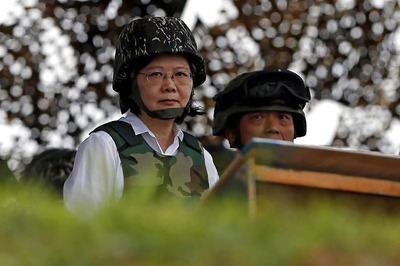
views
London: British Prime Minister Theresa May suffered a huge blow on Thursday as Dominic Raab quit as her Brexit secretary over a proposed EU withdrawal agreement.
May was preparing to start selling her Brexit deal to parliament, boosted by news that Europe is preparing a rapid summit to sign off on the agreement.
But the ground began to shift beneath her when Raab said he could not back the draft deal.
"I cannot reconcile the terms of the proposed deal with the promises we made to the country in our manifesto," he said.
"You deserve a Brexit secretary who can make the case for the deal you are pursuing with conviction...I must resign."
Raab, who had been in place since July, resigned less than an hour after Shailesh Vara quit as a junior Northern Ireland minister over the draft accord.
The pound sterling lost nearly one per cent of its value against the dollar following Raab's resignation, wiping out gains since Tuesday as the draft agreement emerged.
At 0900 GMT, the pound stood at around $1.2870, compared to $1.2992 at 2200 GMT on Wednesday.
May had secured her cabinet's collective approval for the agreement during a five-hour meeting on Wednesday, an important step that helped allay growing fears in the business community of a disorderly divorce.
She was due to set out the terms of the draft withdrawal agreement with the European Union to parliament's lower House of Commons, which must approve the deal before Brexit day on March 29.
European Council President Donald Tusk said in Brussels that unless problems emerge as EU member states examine the deal, he will host a summit to sign the accord in Brussels on November 25.
May's governing centre-right Conservative Party — which does not command a Commons majority — was already split between Brexiteers and those who wanted to remain in the union, and now many on both sides of that divide oppose her deal.
Raab had backed Britain leaving the EU in the 2016 referendum, while Vara wanted the UK to stay in the bloc.
In quitting the cabinet, Raab said he believed the regulatory regime proposed for Northern Ireland presented a "very real threat" to the United Kingdom's integrity.
Raab added that he was opposed to "an indefinite backstop arrangement" to guarantee the Irish border remains free-flowing, saying the EU would hold "a veto over our ability to exit".
Vara said the withdrawal agreement fails to leave Britain as a "sovereign, independent country".
The outraged response by many MPs to the deal has heightened concerns that even when finalised, it will not pass parliament.
Hardline Brexit supporters have cried betrayal over the agreement's vision of a close future relationship between Britain and the EU.
May insisted it "brings back control of our money, laws and borders, ends free movement (of people), protects jobs, security and our union".
But she conceded there were "difficult days ahead" as she seeks to woo MPs.
Speaking in Brussels, Tusk said EU member states would have until Tuesday next week to examine the deal and to agree the wording of a parallel political statement setting out goals for the bloc's future relations with London.
After that, preparations will begin for an EU summit on the following Sunday to sign the deal.
"As much as I am sad to see you leave, I will do everything to make this farewell the least painful possible, both for you and for us," said Tusk.
The deal covers citizens' rights, Britain's financial settlement and plans for a post-Brexit transition period during which both sides hope to agree a new trade deal.
The most controversial element is the "backstop" plan to keep Britain in a customs union with the EU until a trade deal is agreed that avoids the need for border checks with Ireland.
Many Brexiteers fear this would leave Britain a "vassal state", tied to the bloc indefinitely.
In a statement outside Downing Street late Wednesday, May said her deal was "the best that could be negotiated".
She said if MPs rejected it they faced Britain leaving without agreement, which experts says could lead to potentially catastrophic economic and legal disruption.
She also raised the risk of "no Brexit at all", a warning likely intended for her eurosceptic MPs but which was seized upon with enthusiasm by campaigners for a second referendum.
A small but growing number of Conservative MPs back a second vote with the option to stay in the EU, although May has rejected the idea.




















Comments
0 comment